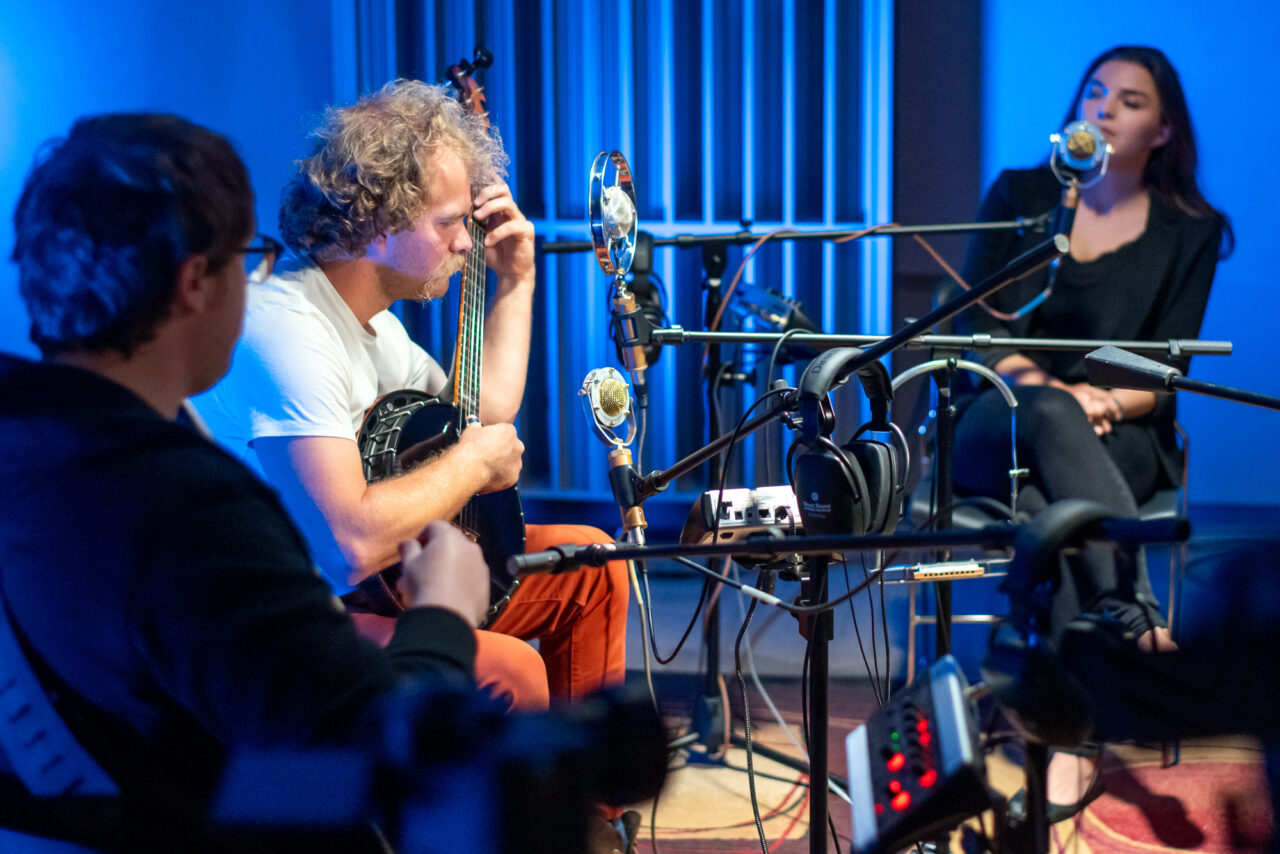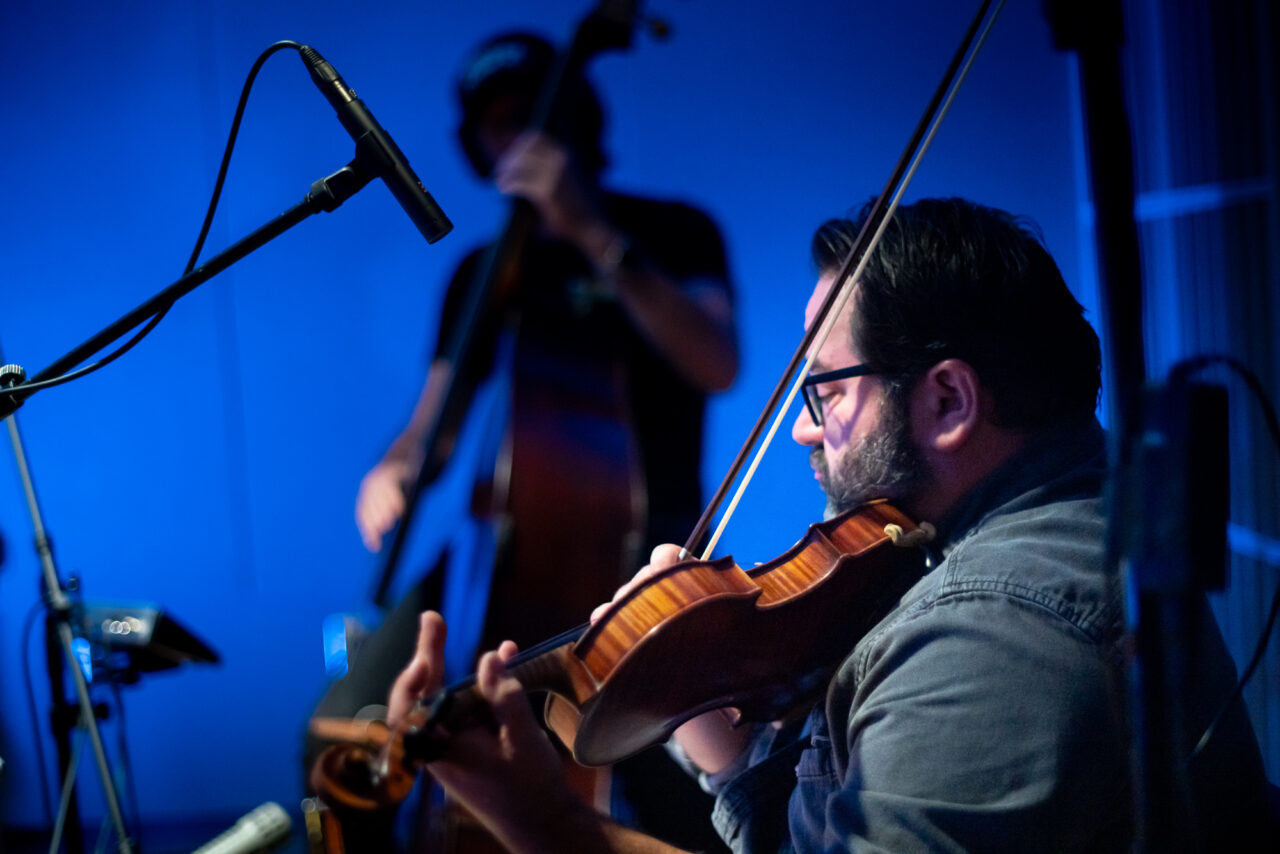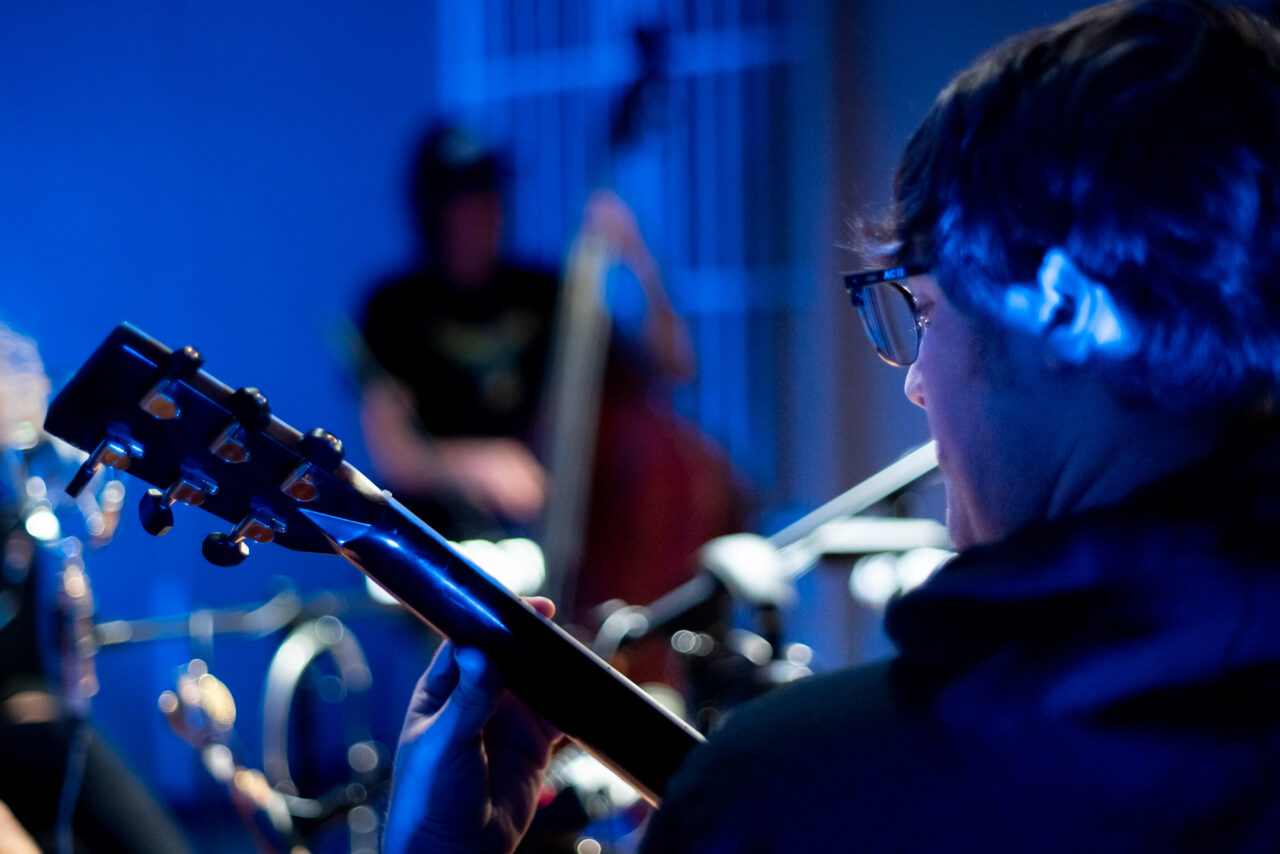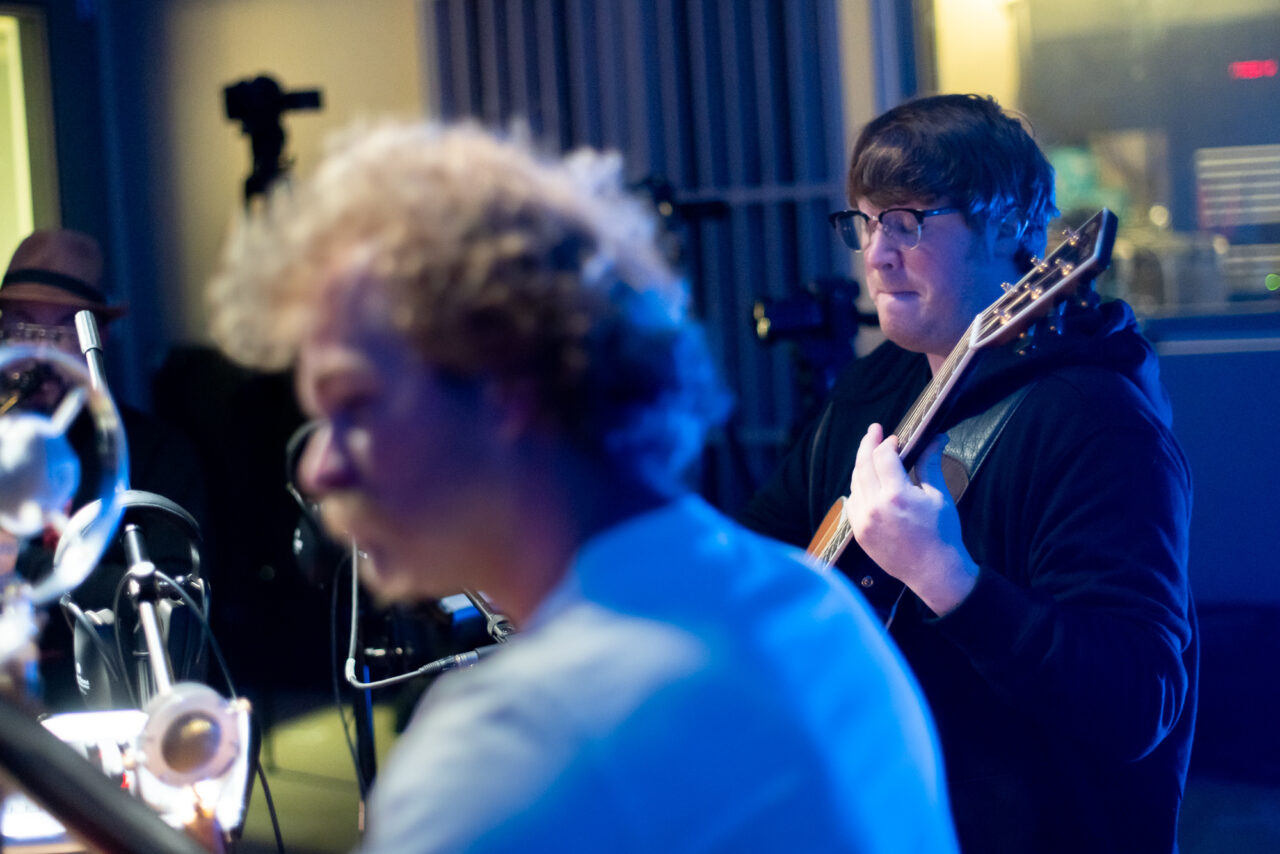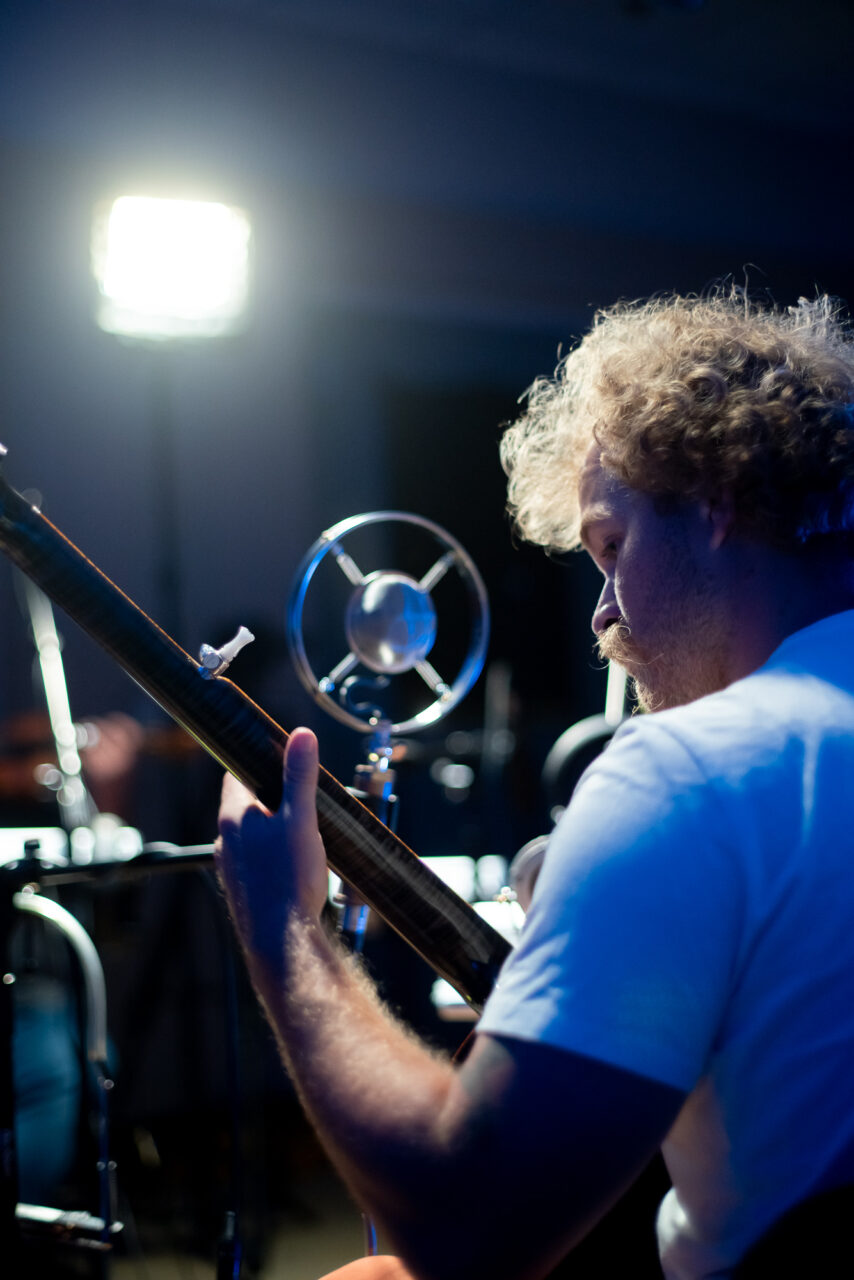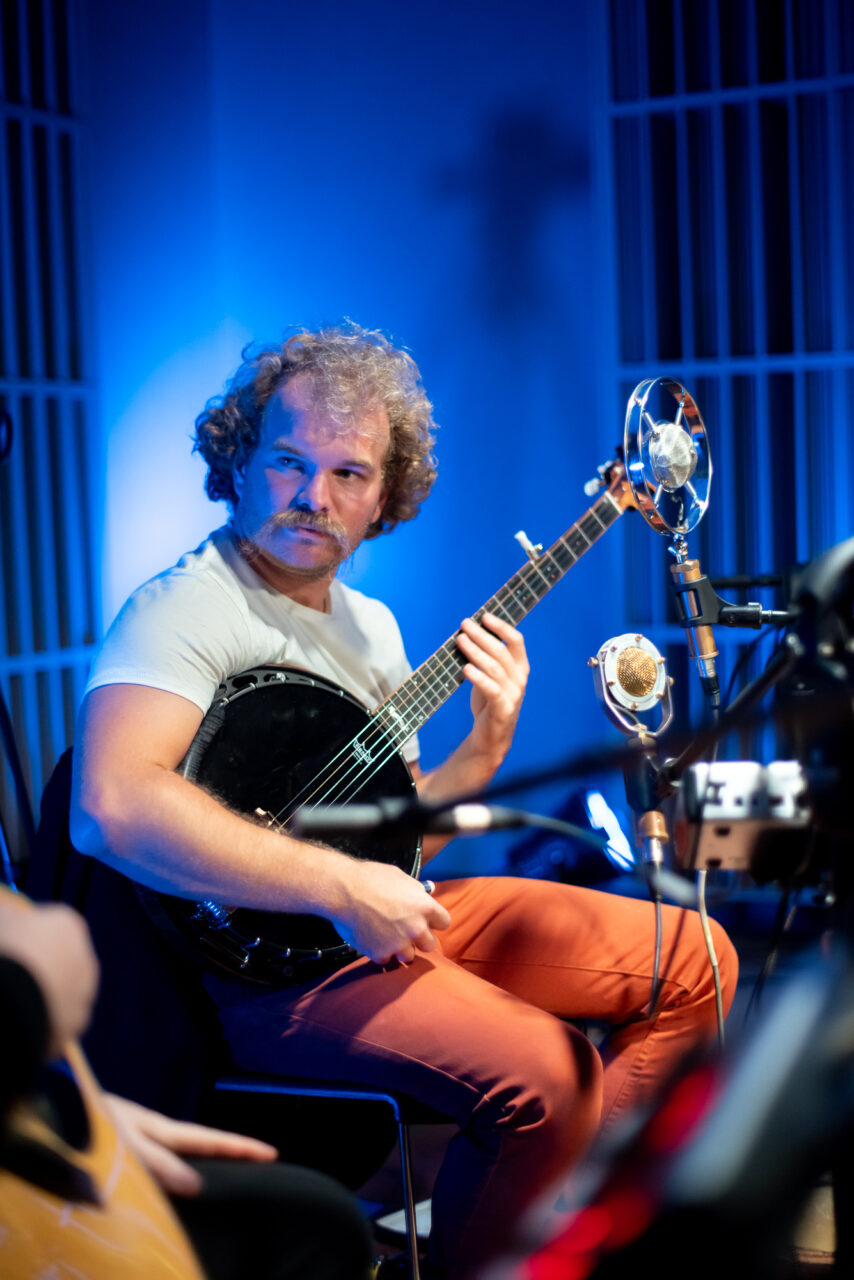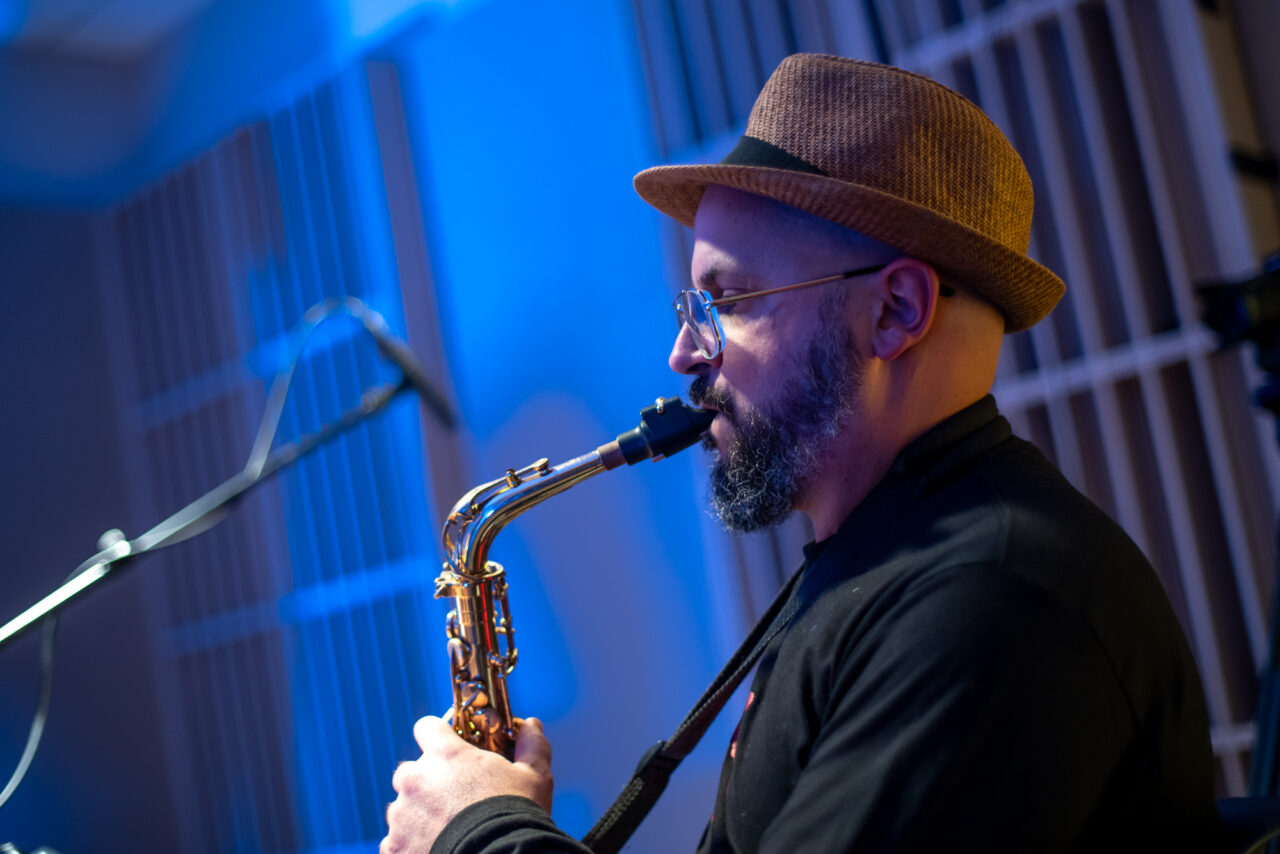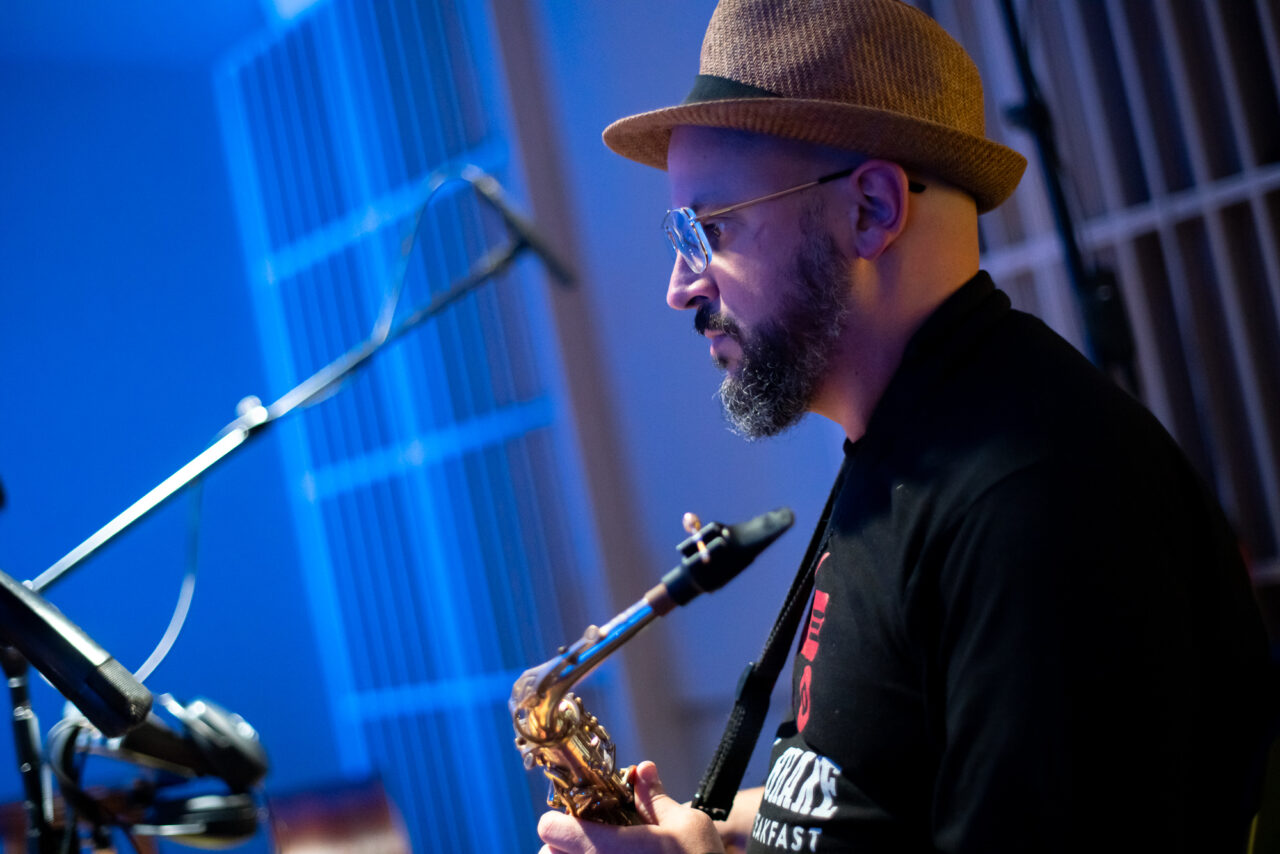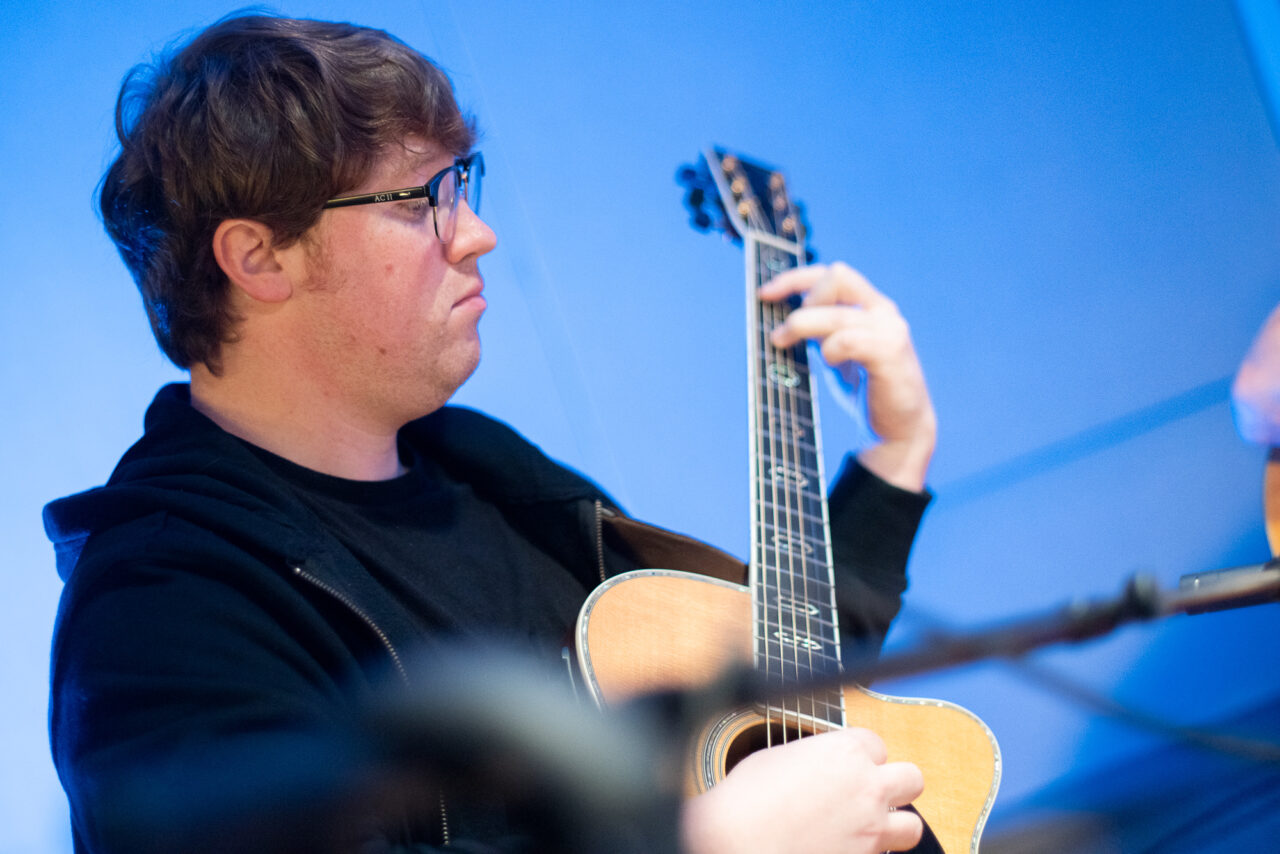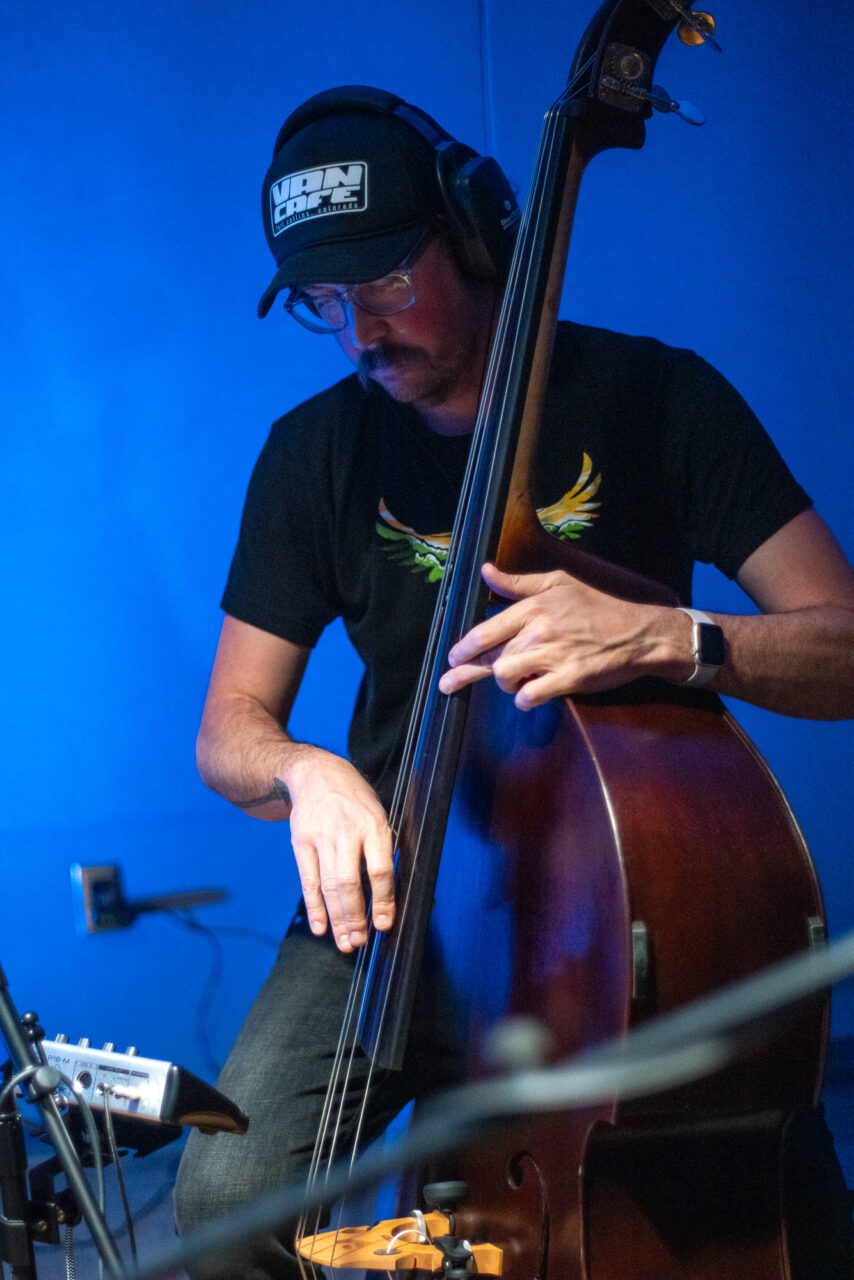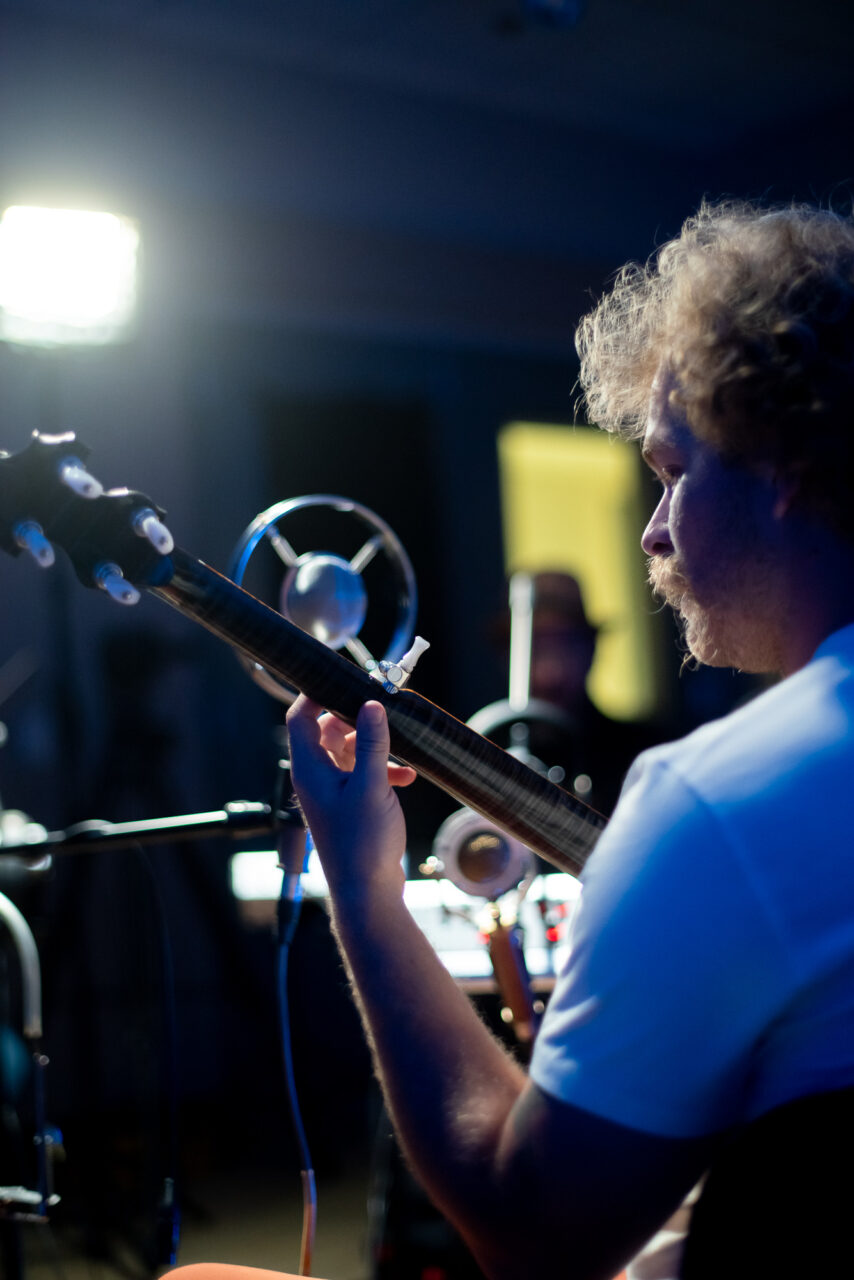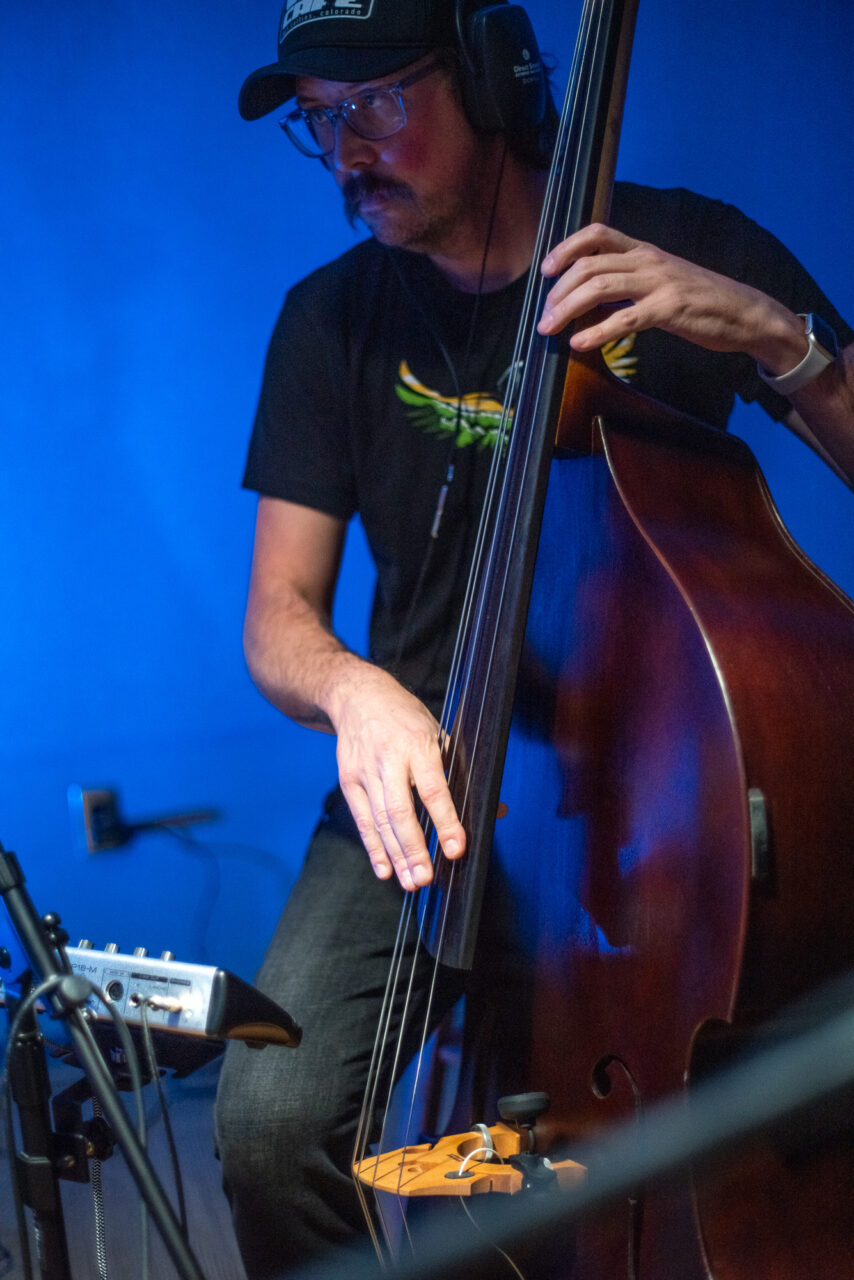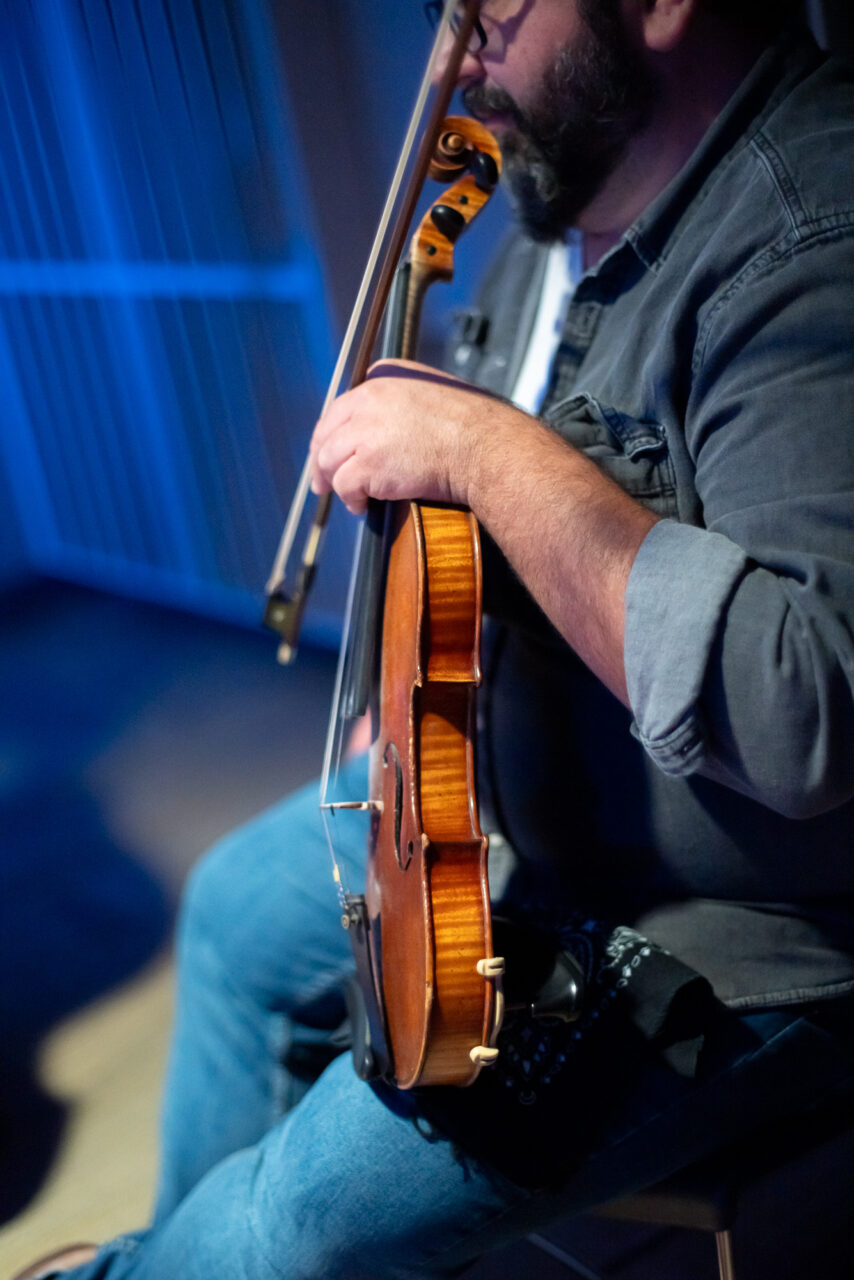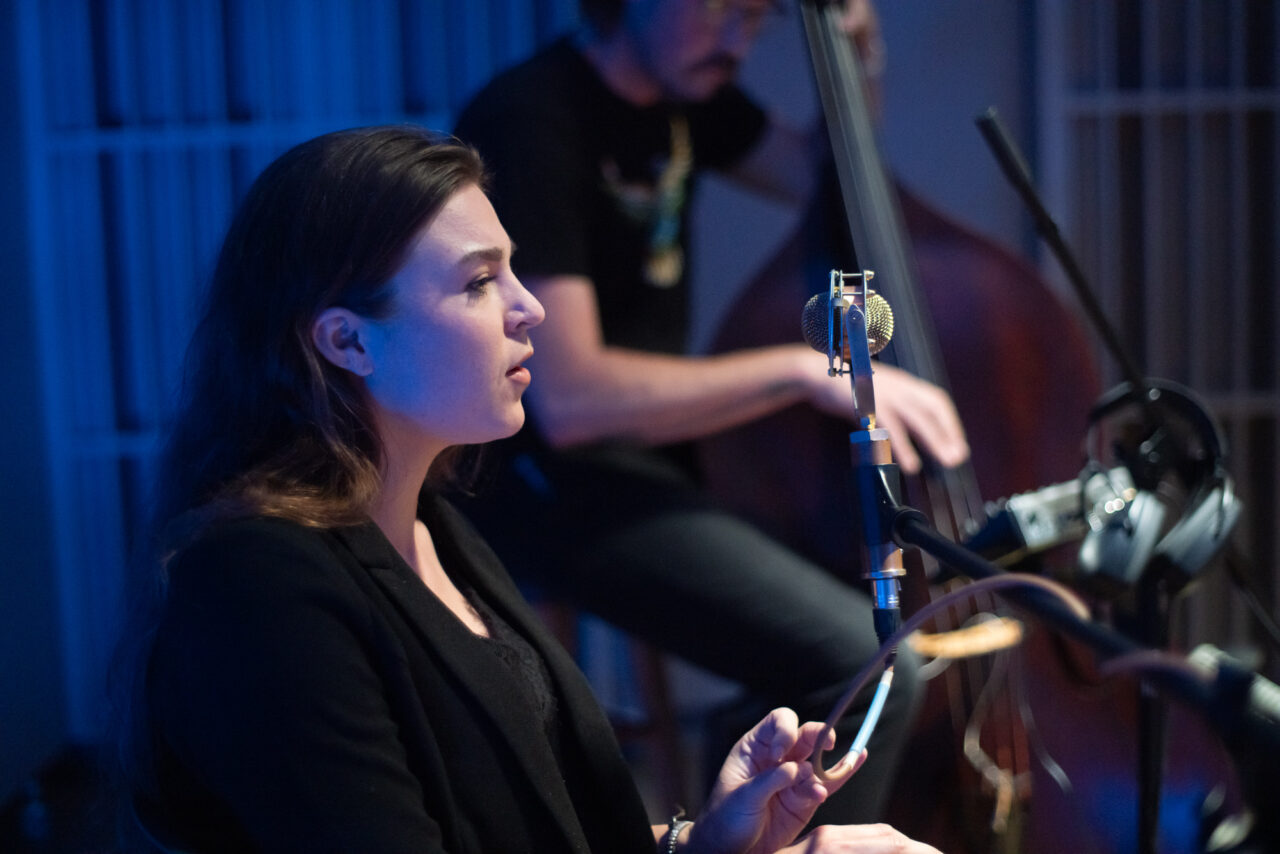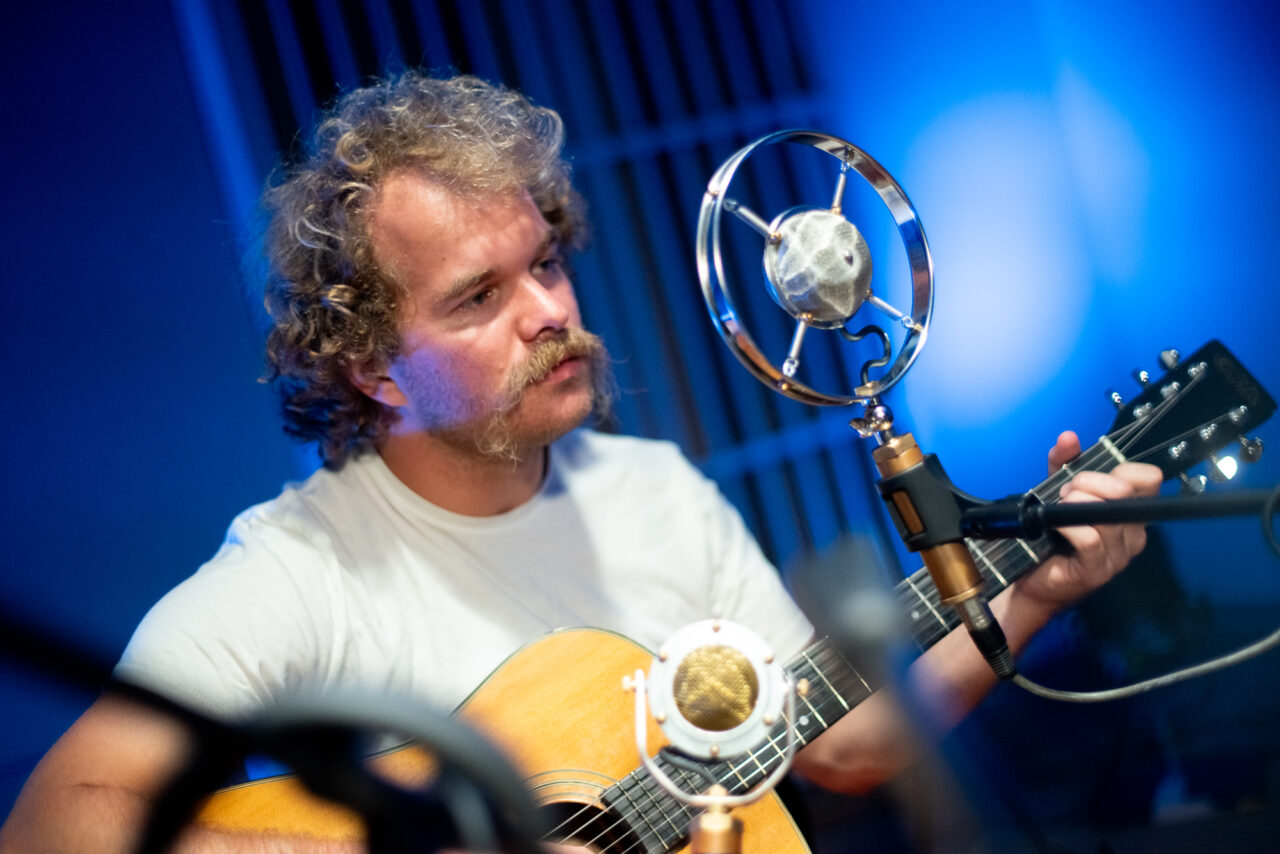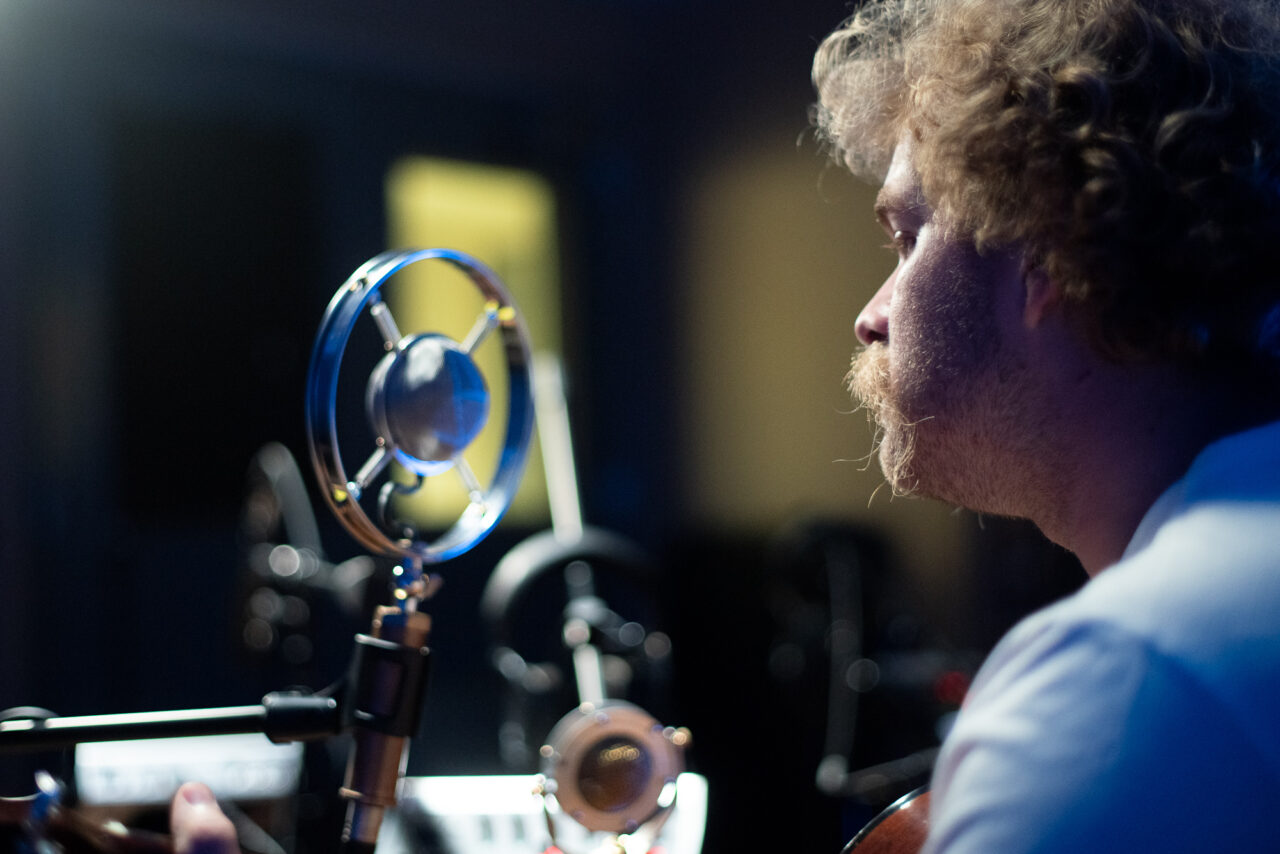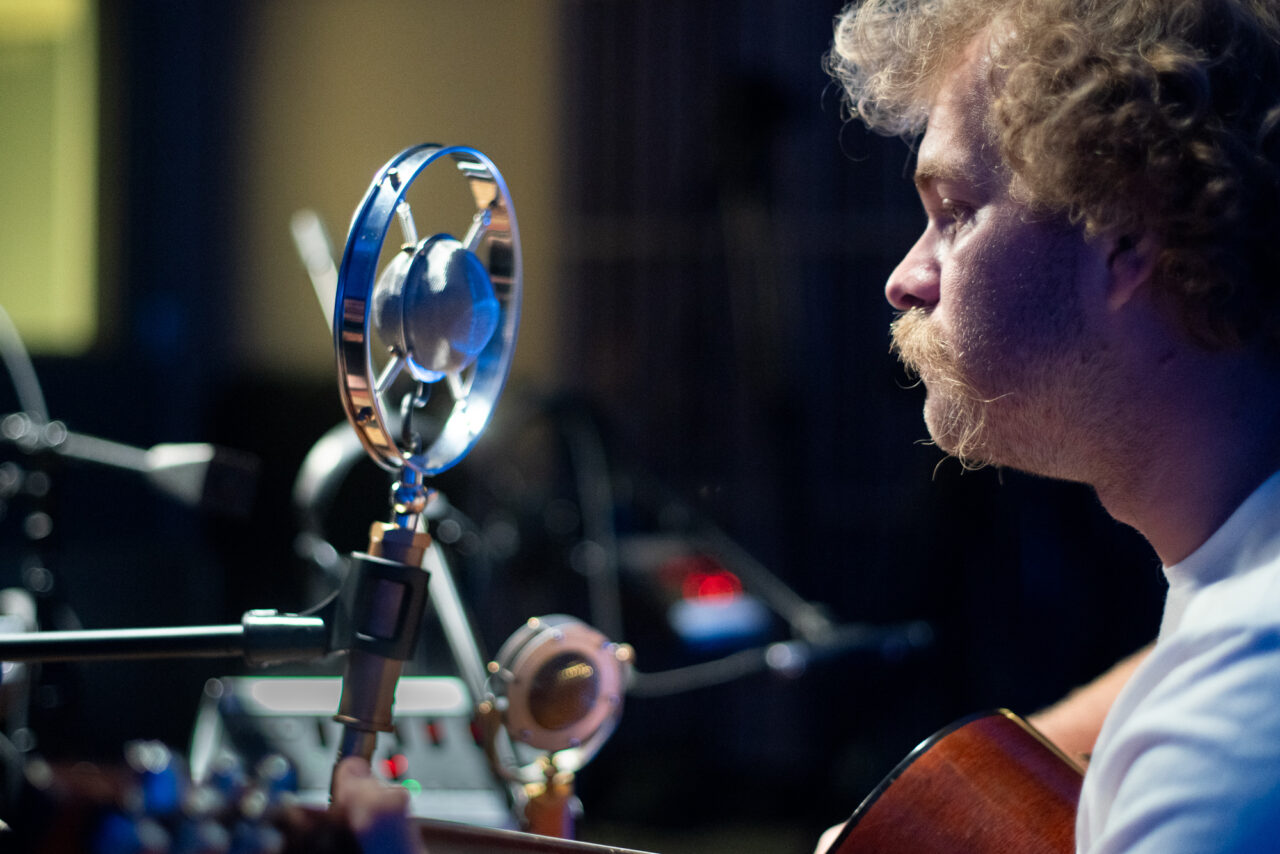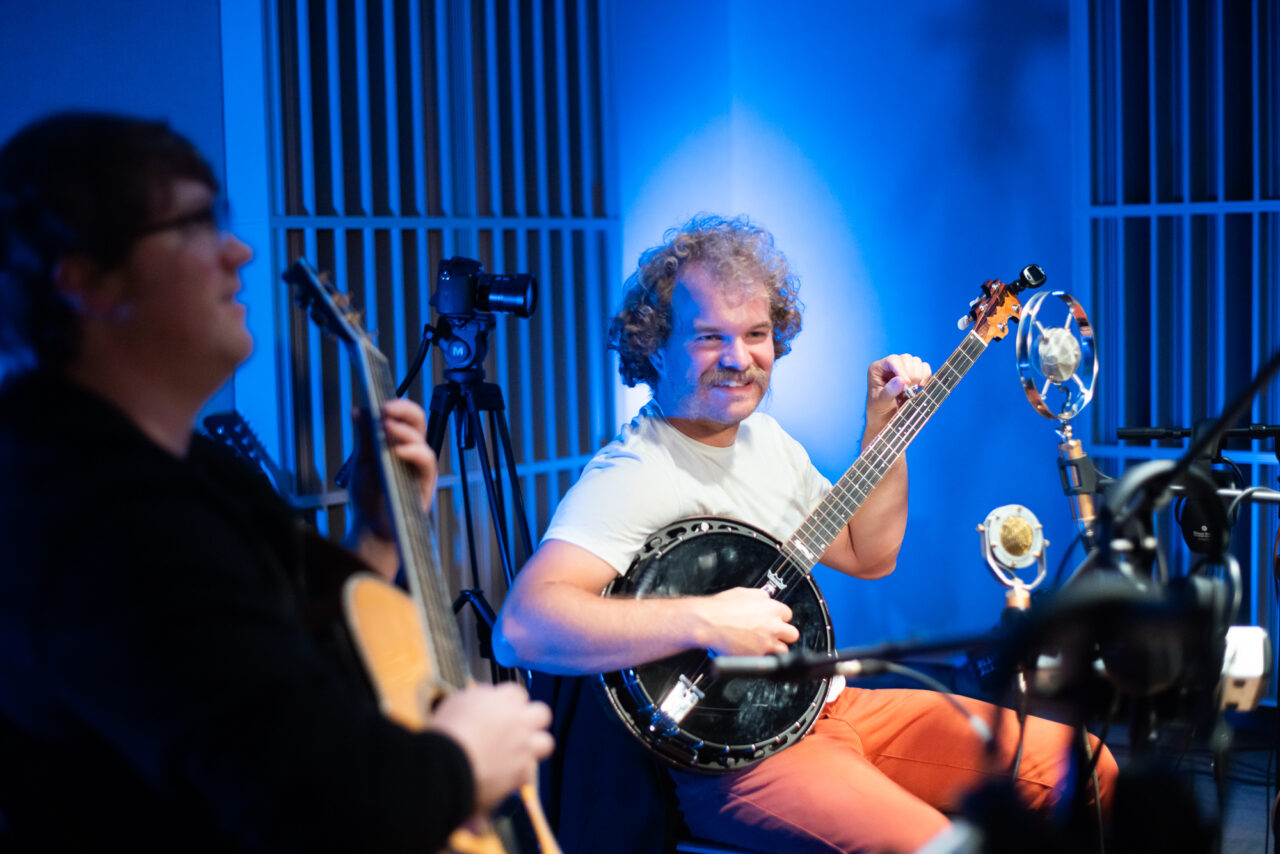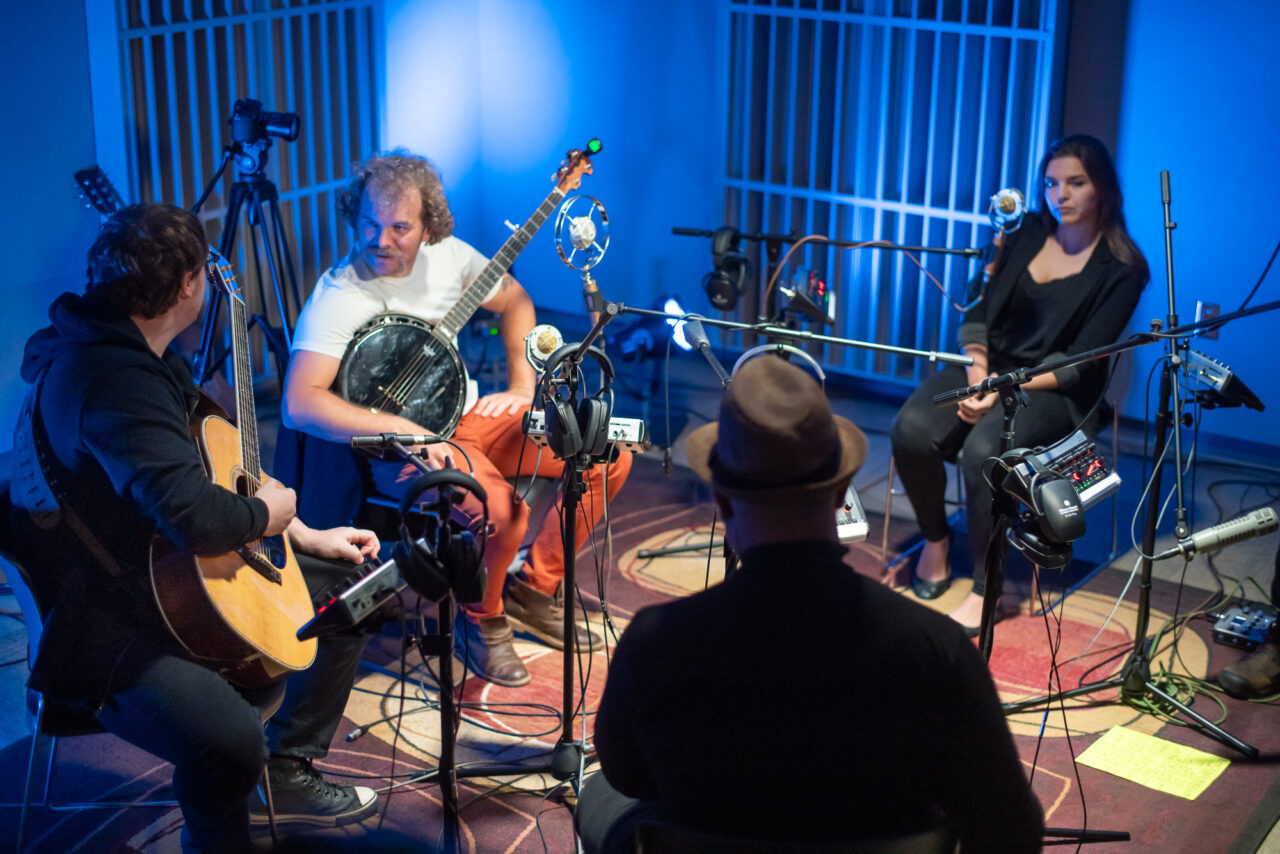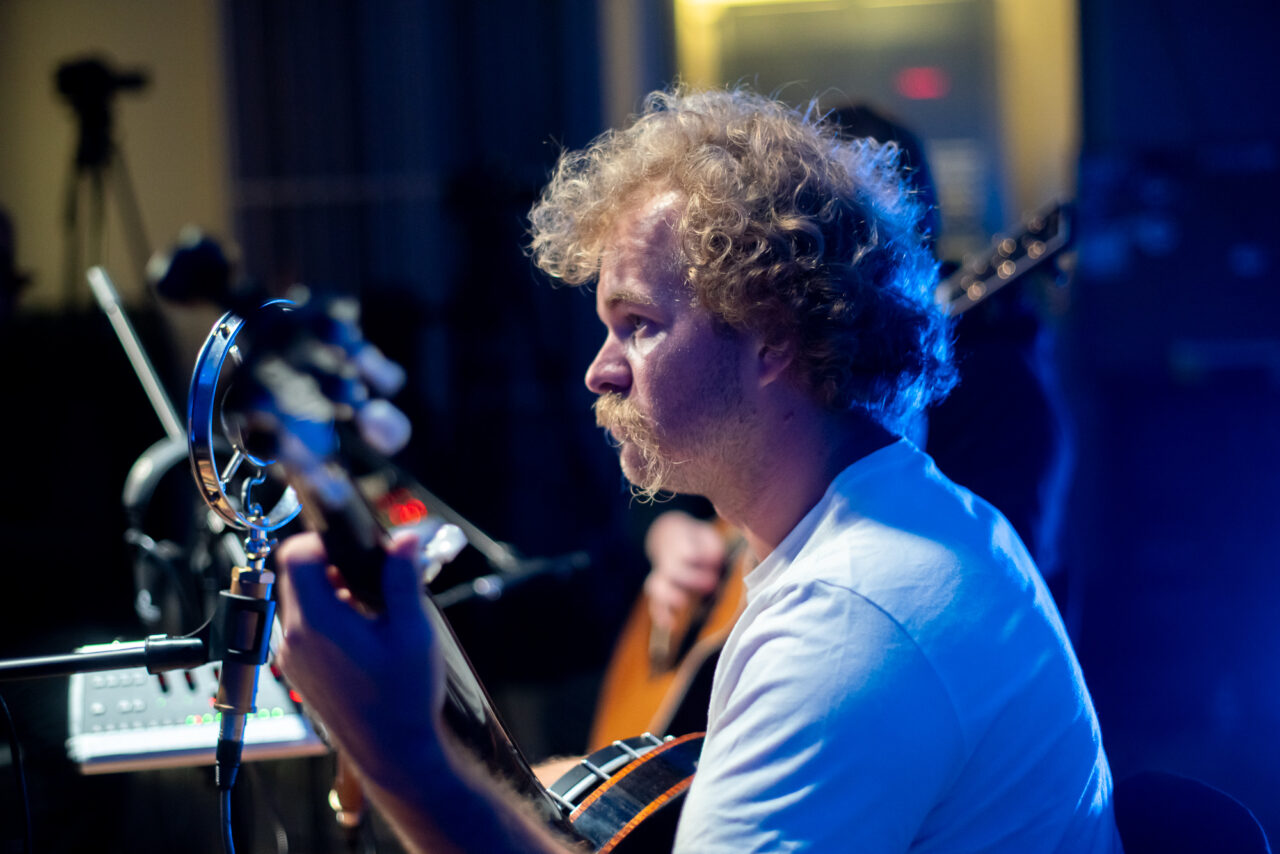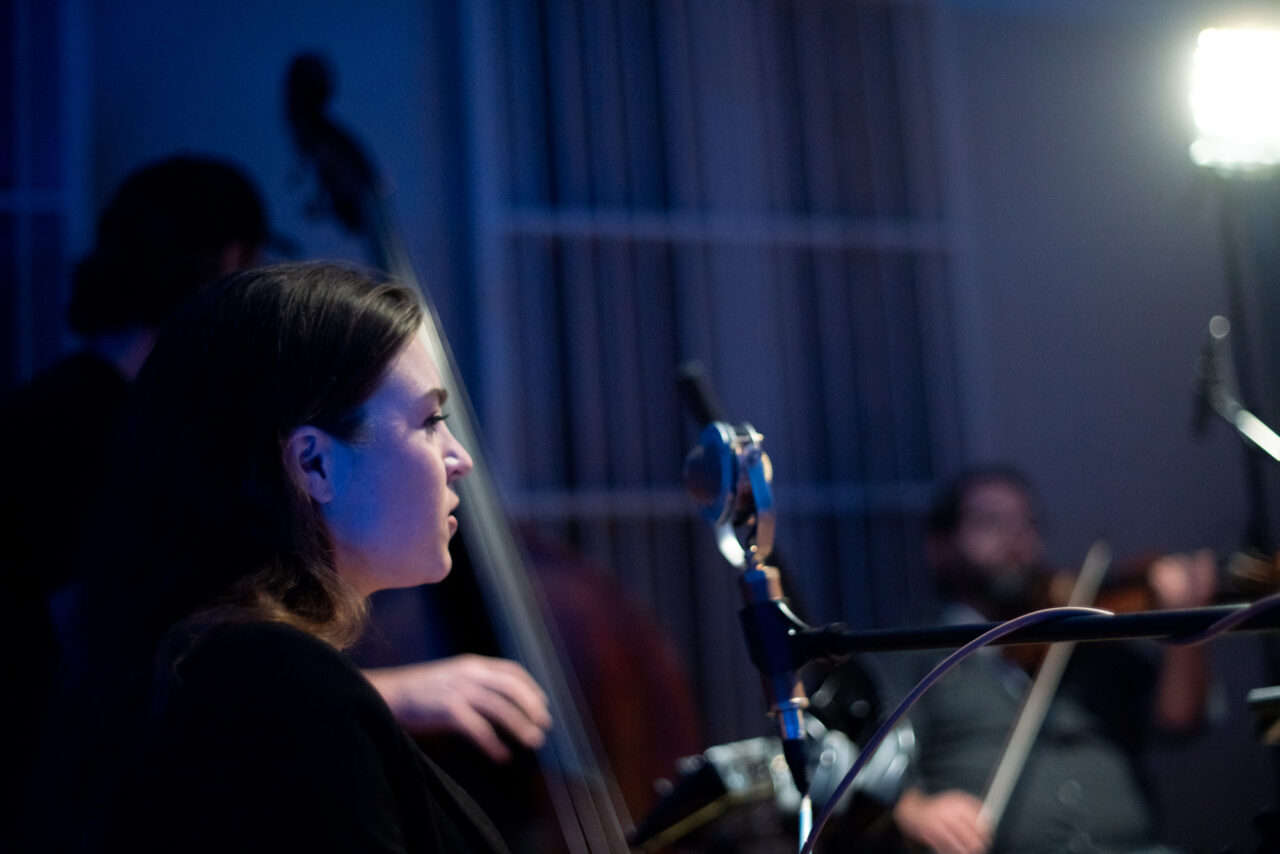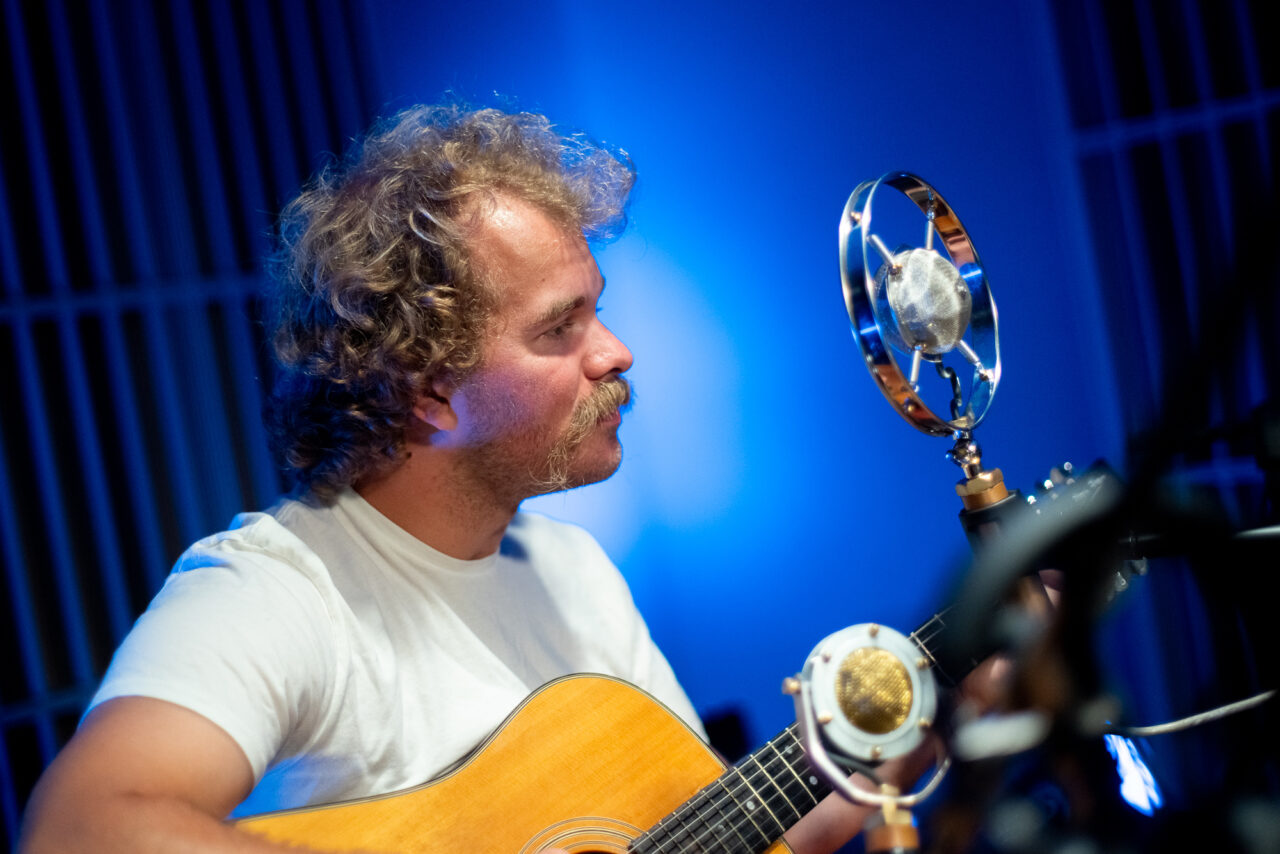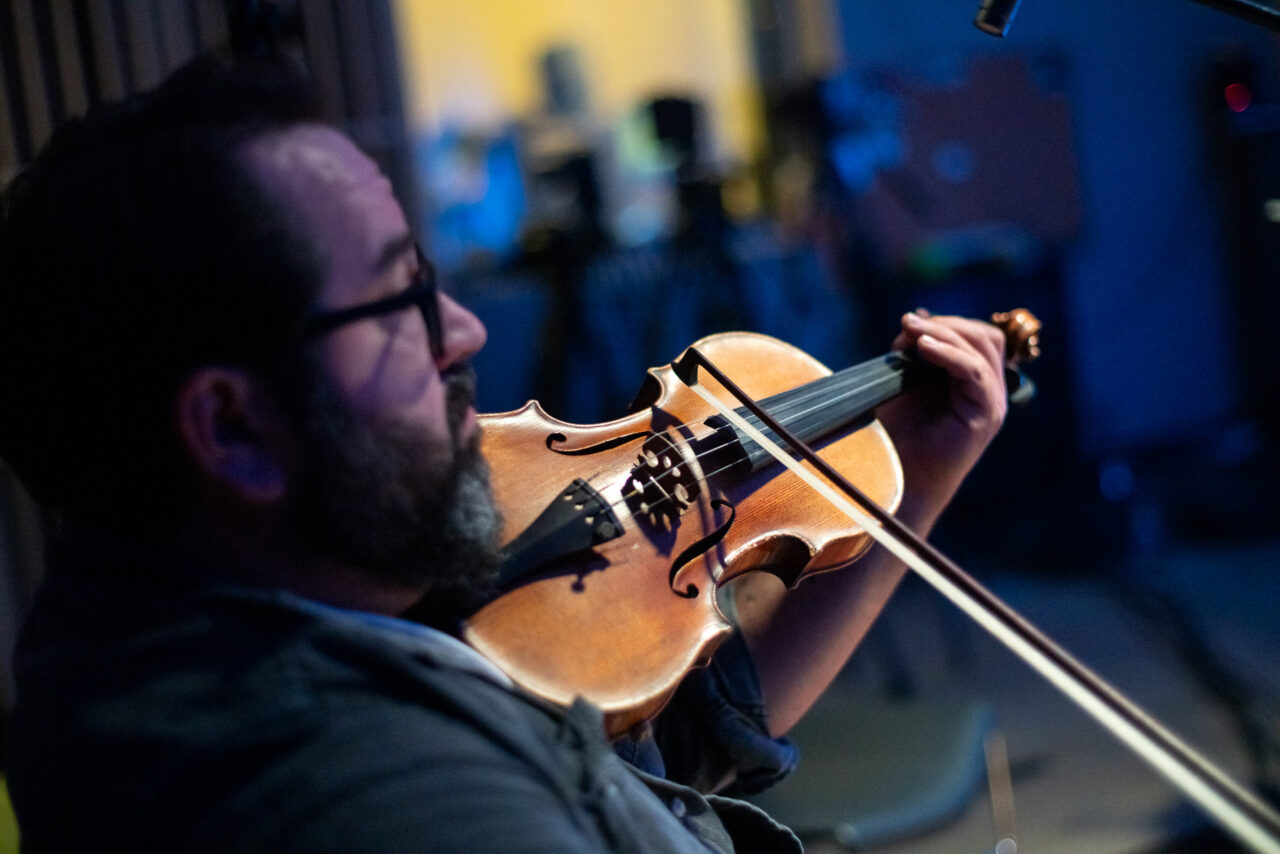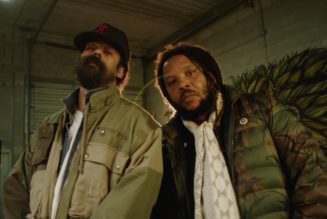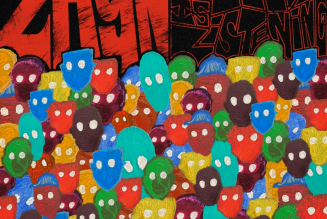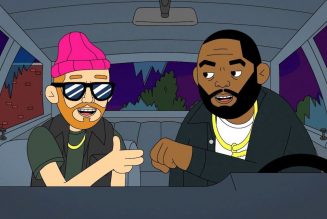Big garden, small community vibes.
-
Joe Ulrich
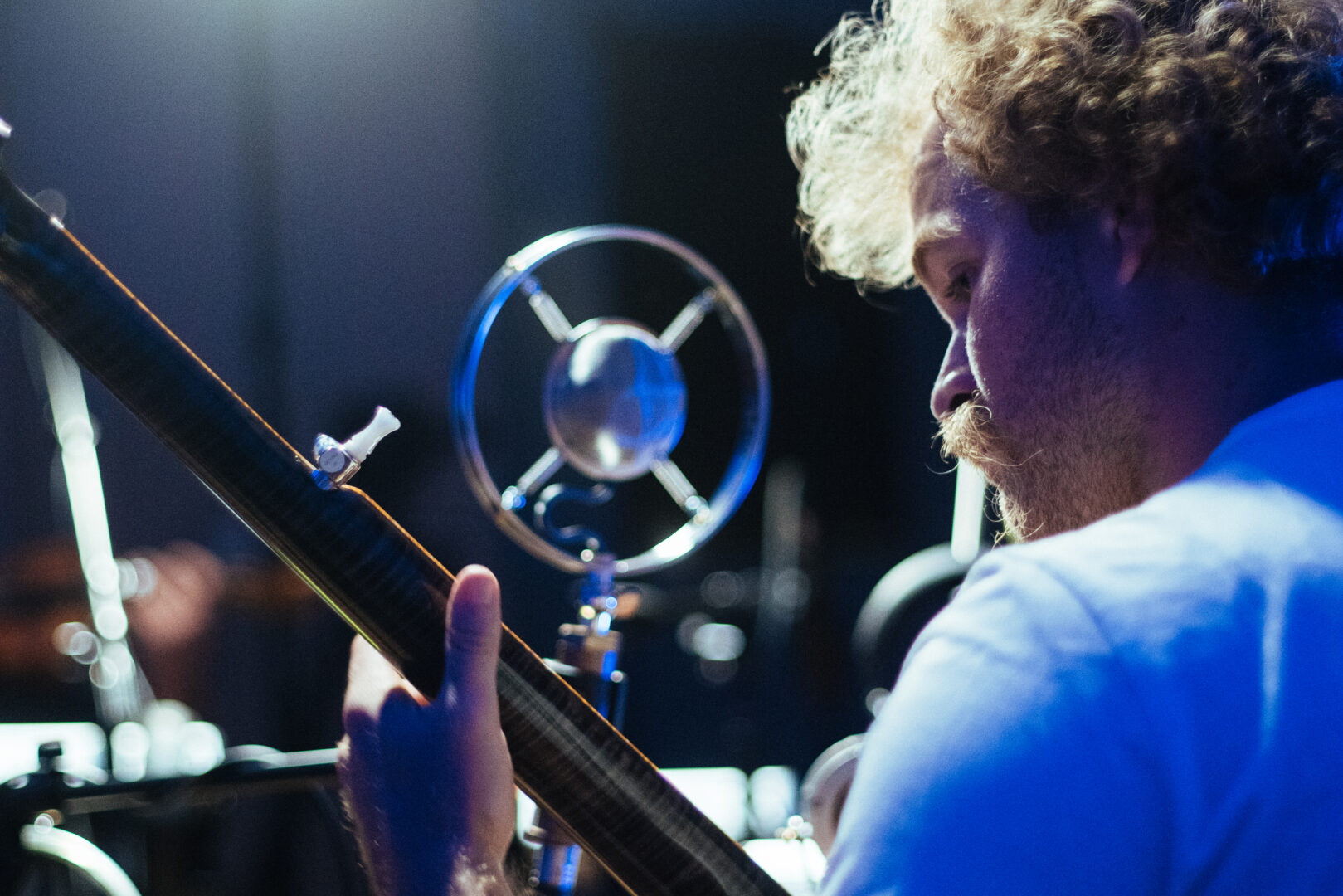
Joe Ulrich / WITF
Tanner Bingaman performs for WITF Music on October 9, 2023. (Joe Ulrich – WITF)
Joe Ulrich: Tell me about the name Pretty Big Garden.
Tanner Bingaman: I wrote a tune last year called Repotting Plants. There’s a line in it that’s, “if it all works out the way we want it, I think we’ll end up with a pretty big garden”. And it felt just like one of the first things I’ve written that, to me, would feel cool to build a little aesthetic around.
I worked for six years or so as a farmhand in various settings and capacities. I’ve had my hands in the small farm scene quite a bit. And the whole aesthetic I think is very fitting for people that know me.
Joe Ulrich: Small farming. Like what kind of size?
Tanner Bingaman: Most of the farms I have worked on and helped manage over the years were like seven acres and smaller. Like really into permaculture practices and doing direct to market stuff in small community farmers markets. Very cool grassroots ways to learn how to be the best homesteader on the block.
I find that a lot of my interests are like this. It seems like a lot of things I get into are small, very community oriented, careers, hobbies, lifestyles, whatever. And I think there’s a lot of overlap between the farming community and the music community. They have a similar energy about them when you get plugged into a small group of people trying to do the same thing.
Joe Ulrich: Did you grow up with that mindset or was that something you discovered later on in your life?
Tanner Bingaman: I grew up in a small town, but I think I never really felt a sense of community. And it was something that, you leave your hometown and kind of figure out where you’re lacking and the things that you wish were parts of your character. And you pursue them and develop them. I got really into playing and writing and learning and just being involved in music when I was 14 or 15. And I think that was my first experience with being involved in something outside of organized sports that was very community oriented. It was in a totally different way you can’t get from middle school or high school sports team.
Music at its best is only supportive and empathetic and there’s not competition.
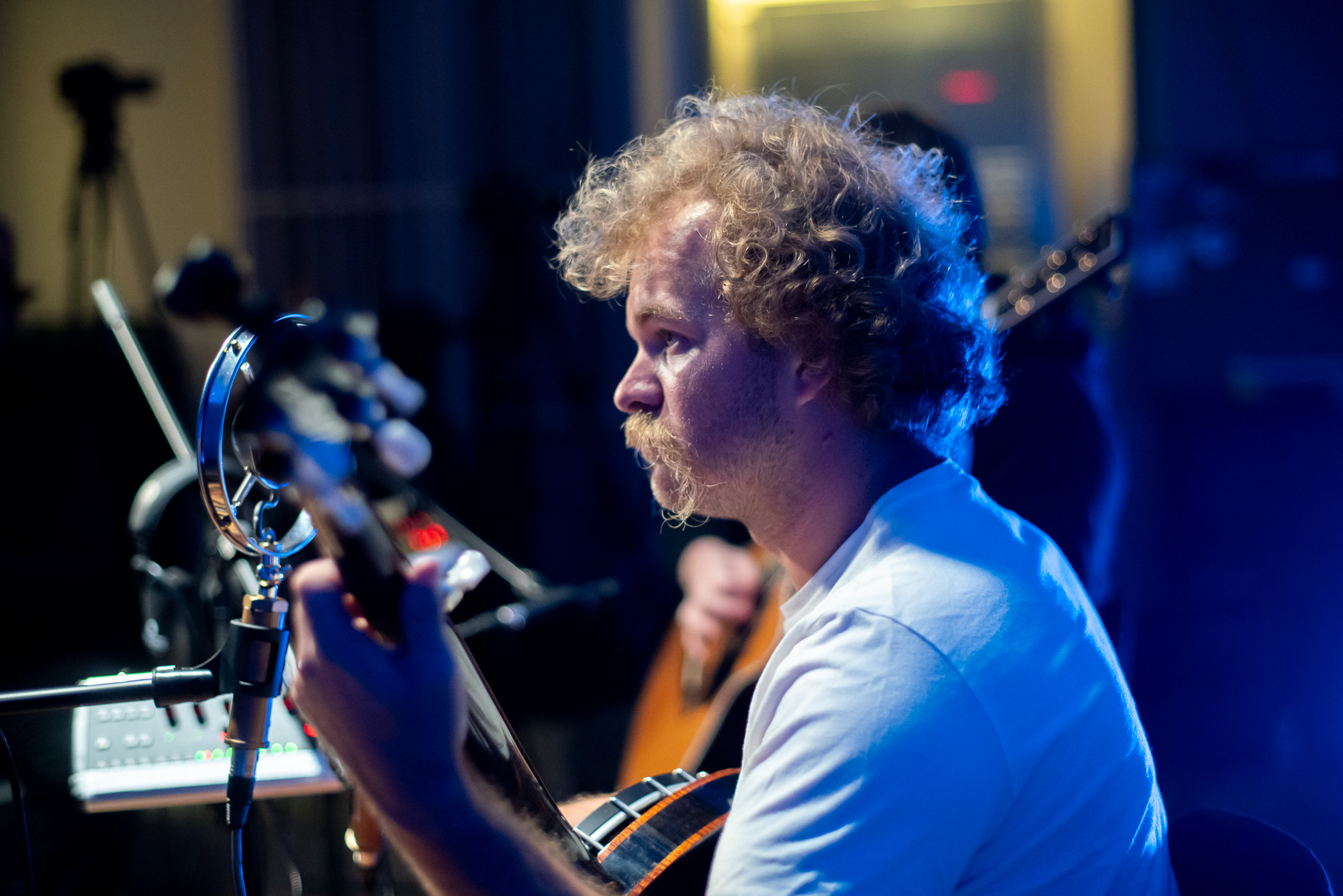
Joe Ulrich / WITF
Tanner Bingaman performs for WITF Music on October 9, 2023. (Joe Ulrich – WITF)
Joe Ulrich: “Like Mike.” Describe that song for me.
Tanner Bingaman: “Like Mike” is dedicated to my buddy Mike Piccaro. We went to college together and played gigs. Mike came from the jazz world pretty heavy, so he would throw these tunes at me that I’d really had no business playing. When I wrote “Like Mike”, I sent it to him and he was like, that’s sweet. I don’t think it’s done yet, but that’s really cool.
And then I sent him the finished thing and he was very excited about it. So I decided to name it after him.
Joe Ulrich: It’s gypsy jazz, right?
Tanner Bingaman: Yeah. I love all the Django jazz stuff, and I fake my way through very small amounts of it. So I’m a super heavy jazz listener, but I don’t know note for note a single standard, but I definitely have plenty of tunes of mine that, if someone from the jazz world hears, they’re clearly like, that’s a jazz song.
Joe Ulrich: It is interesting how you are an amalgamation of everything you’ve ever heard.
Tanner Bingaman: Yeah. And a lot of my favorite players are jazz musicians and a lot of conceptual things from the jazz world too. I improvise all the time. This whole project is based on improvising. We don’t rehearse really. It’s all friends that I’m close with and are very good players. So I know if we have a gig, they can show up and I can send them a set list beforehand and they’ll say, Oh yeah, I’ll listen on the way.
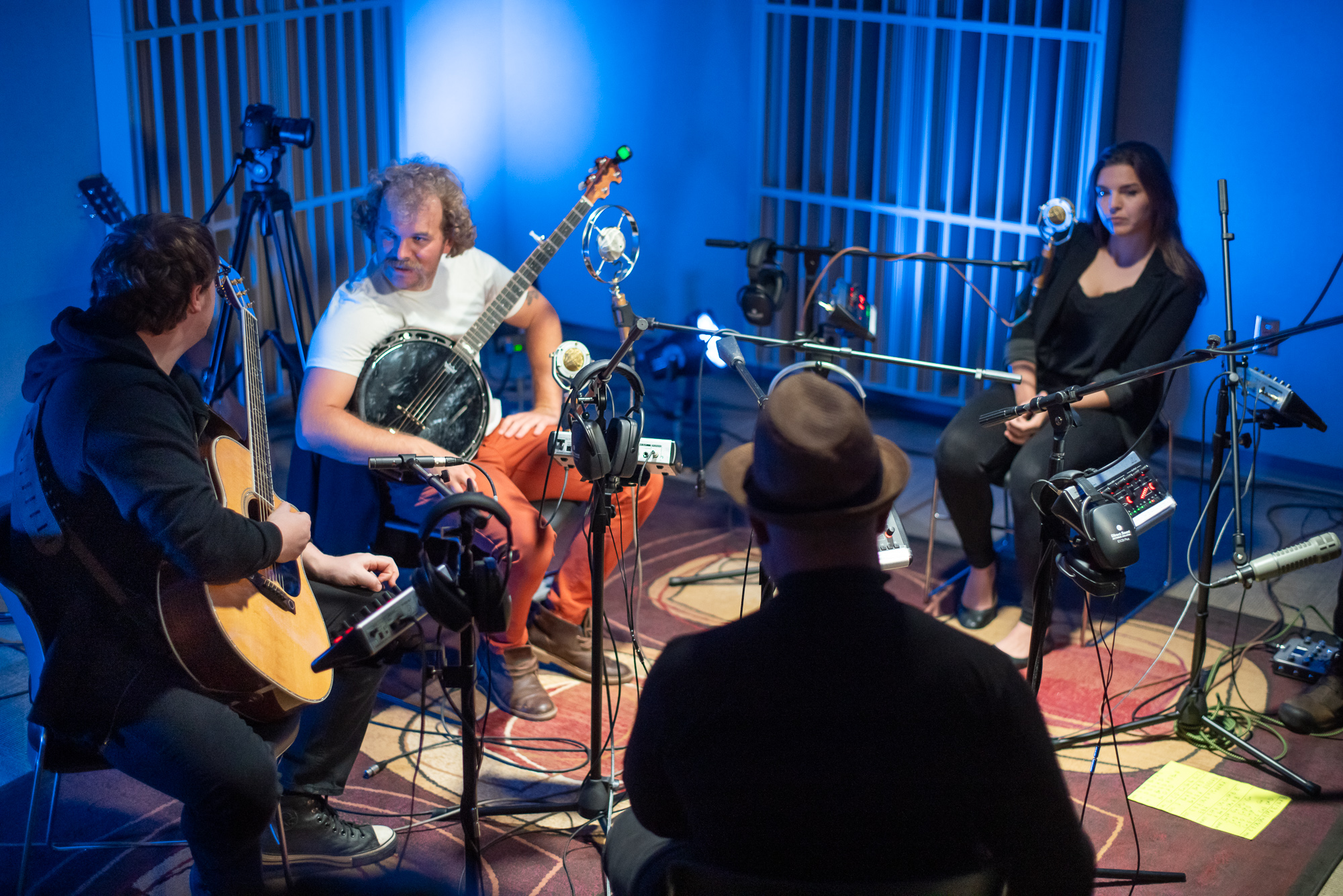
Tanner Bingaman’s Pretty Big Garden performs for WITF Music on October 9, 2023. (Joe Ulrich – WITF)
Joe Ulrich: On your website, you described loosely the music as mountain music.
Tanner Bingaman: I find genres very strange in general, especially as a writer. Like the tunes we did today, they’re all three very different. “Bottle’s” a straight up trash grass, desert trash music song. “Like Mike” could be in any swing band. And then, “Sweet Mary Ann” I feel is very straight up what people call folk, storyteller.
They only can sound a little bit cohesive because it’s all done on acoustic instruments, but as far as pinning it to a genre and making things marketable and that sort of thing, it’s, I’ve always been weirded out by labeling and genres in general because I think it is mostly derived from people just trying to make a buck.
And mountain music is just my little snarky way of skirting around all that because there’s a lot of mountains out there.
Joe Ulrich: In a social media post you had talked about doing less and less on social media and doing more with a newsletter. Tell me about why you wanted to get away from social media.
Tanner Bingaman: I haven’t wanted to be on social media for a lot of years now and I know my mental health is better when I’m not on it. So I stay on it to engage with the music community more or less, and use the promotional aspects of it. And it’s a great way to get the word out about events. But I noticed this thing the past few years where it seemed like there’s like always trolls and naysayers and like people that. You get this feeling of, why are you keeping up with what I’m doing anyway? A newsletter seems like the way to engage with people directly that really want the best version of what you’re putting out and they want to keep up with every time you release a new song.
And it’s been night and day. Since I started that newsletter, I have yet to experience someone that has just basically gone out of their way to be mean. I just I don’t like engaging in social media that much. It changes all the time and creators give so much of themselves away on social media. And our culture right now has this weird expectation that there’s no longer mysticism around art.
Joe Ulrich: What do you mean by that exactly?
Tanner Bingaman: Before the internet age, I guess it was mostly written media and radio interviews and stuff. But those were isolated scenarios. And the social media world, it seems like the trend is,it’s an everyday thing and it’s something people engage with.
There’s almost a weird expectation of comedians and songwriters and painters to give away every bit of everything that you’re doing for the sake of hoping that you garner a big enough following to make a sustainable career out of what you’re doing.
I like to not have to know everything about that person’s life. And so the newsletter thing, it’s my way of keeping close to myself some of some parts of what I do. We’re running an experiment as we speak with all of our mental health. And the outcome doesn’t look great thus far.
Joe Ulrich: Do you have a favorite phone app? One that you’re always using?
Tanner Bingaman: I used to use Mountain Project a lot. That’s a rock climbers forum, more or less. If you go to Yosemite to rock climb, there’s dozens of guidebooks with routes and what’s called beta, just information about how to do the climbs. And it’s user generated beta for rock climbing and mountaineering.
Shout out to Jah Chimney. It’s a rock climb that my buddy Dan and I got the first ascent of. It’s in Moab, Utah. I summited it very late at night and that name just popped in my head. So we called it Jah Chimney.
Joe Ulrich: The skies must have been amazing. You almost get like dizzy looking at that.
Tanner Bingaman: There’s a lot of really cool, timeless ideas that come out of that sort of experience of looking up and feeling a sense of awe. And there’s some sense [that] this could end at any moment. Things are much more fragile and I’m way more small than I perceive myself to be in my day to day existence.
- Tanner Bingaman’s Pretty Big Garden performs for WITF Music on October 9, 2023. l-r: Allan Combs II, Tanner Bingaman, Lauren Kerstetter (Joe Ulrich – WITF)
- Joseph McAnulty performs with Tanner Bingaman’s Pretty Big Garden for WITF Music on October 9, 2023. (Joe Ulrich – WITF)
- Allan Combs II performs with Tanner Bingaman’s Pretty Big Garden for WITF Music on October 9, 2023. (Joe Ulrich – WITF)
- Tanner Bingaman’s Pretty Big Garden performs for WITF Music on October 9, 2023. l-r: Tanner Bingaman, Allan Combs II (Joe Ulrich – WITF)
- Tanner Bingaman’s Pretty Big Garden performs for WITF Music on October 9, 2023. (Joe Ulrich – WITF)
- Tanner Bingaman’s Pretty Big Garden performs for WITF Music on October 9, 2023. (Joe Ulrich – WITF)
- Jason Mescia of Tanner Bingaman’s Pretty Big Garden performs for WITF Music on October 9, 2023. (Joe Ulrich – WITF)
- Jason Mescia of Tanner Bingaman’s Pretty Big Garden performs for WITF Music on October 9, 2023. (Joe Ulrich – WITF)
- Allan Combs II with Tanner Bingaman’s Pretty Big Garden performs for WITF Music on October 9, 2023. (Joe Ulrich – WITF)
- Eric Avey of Tanner Bingaman’s Pretty Big Garden performs for WITF Music on October 9, 2023. (Joe Ulrich – WITF)
- Tanner Bingaman’s Pretty Big Garden performs for WITF Music on October 9, 2023. (Joe Ulrich – WITF)
- Eric Avey of Tanner Bingaman’s Pretty Big Garden performs for WITF Music on October 9, 2023. (Joe Ulrich – WITF)
- Joseph McAnulty perofmrs with Tanner Bingaman’s Pretty Big Garden for WITF Music on October 9, 2023. (Joe Ulrich – WITF)
- Lauren Kerstetter performs with Tanner Bingaman’s Pretty Big Garden for WITF Music on October 9, 2023. (Joe Ulrich – WITF)
- Tanner Bingaman’s Pretty Big Garden performs for WITF Music on October 9, 2023. (Joe Ulrich – WITF)
- Tanner Bingaman’s Pretty Big Garden performs for WITF Music on October 9, 2023. (Joe Ulrich – WITF)
- Tanner Bingaman’s Pretty Big Garden performs for WITF Music on October 9, 2023. (Joe Ulrich – WITF)
- Tanner Bingaman’s Pretty Big Garden performs for WITF Music on October 9, 2023. l-r: Allan Combs II, Tanner Bingaman (Joe Ulrich – WITF)
- Tanner Bingaman’s Pretty Big Garden performs for WITF Music on October 9, 2023. l-r: Allan Combs II, Tanner Bingaman, Jason Mescia, Lauren Kerstetter (Joe Ulrich – WITF)
- Tanner Bingaman performs for WITF Music on October 9, 2023. (Joe Ulrich – WITF)
- Lauren Kerstetter performs with Tanner Bingaman’s Pretty Big Garden for WITF Music on October 9, 2023. (Joe Ulrich – WITF)
- Tanner Bingaman’s Pretty Big Garden performs for WITF Music on October 9, 2023. (Joe Ulrich – WITF)
- Joseph McAnulty performs with Tanner Bingaman’s Pretty Big Garden for WITF Music on October 9, 2023. l-r: Allan Combs II, Tanner Bingaman, Jason Mescia, Lauren Kerstetter (Joe Ulrich – WITF)

